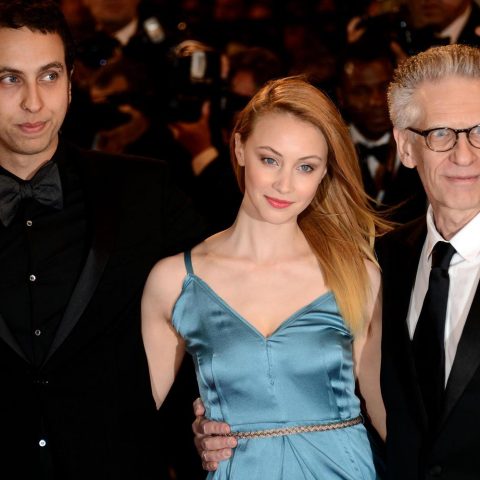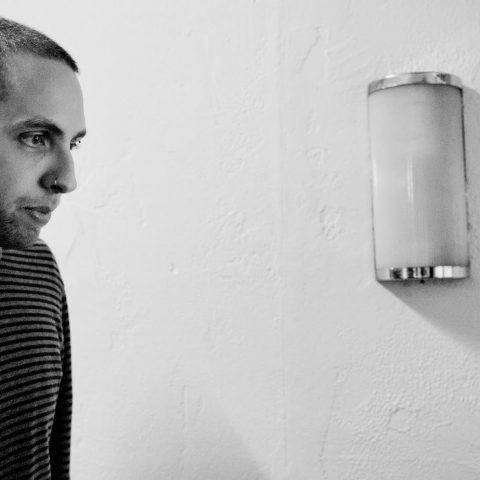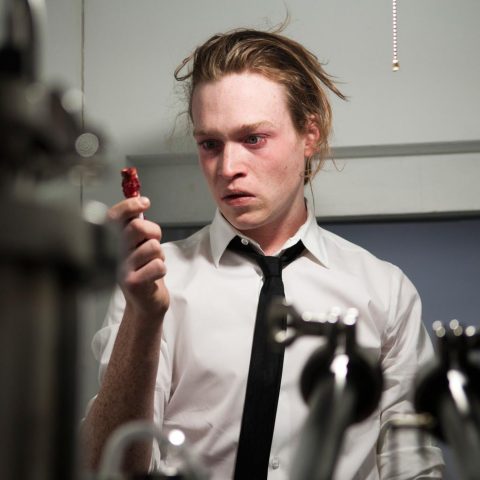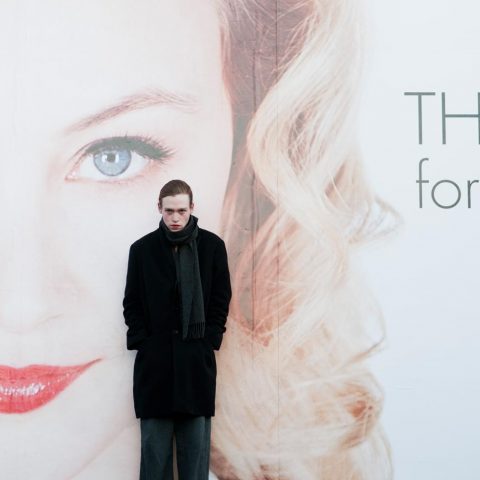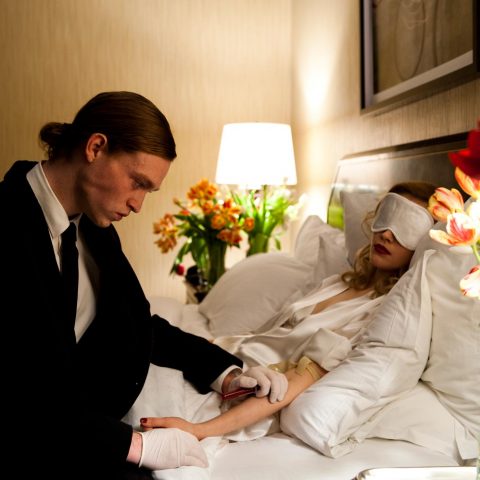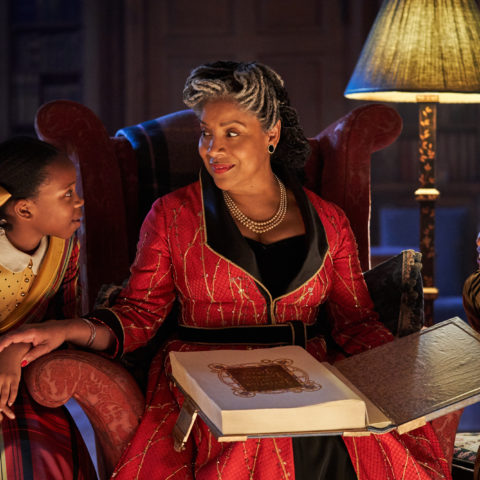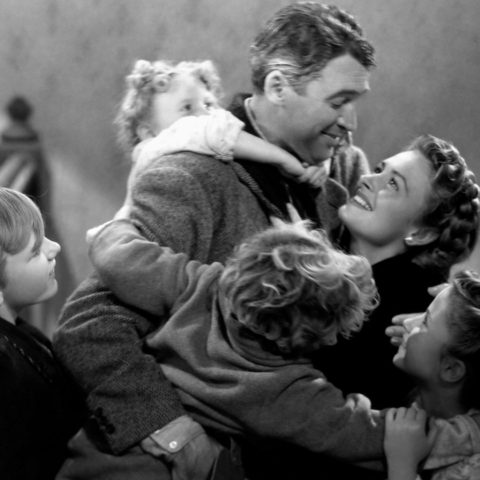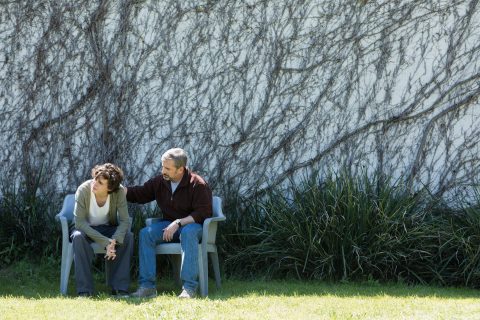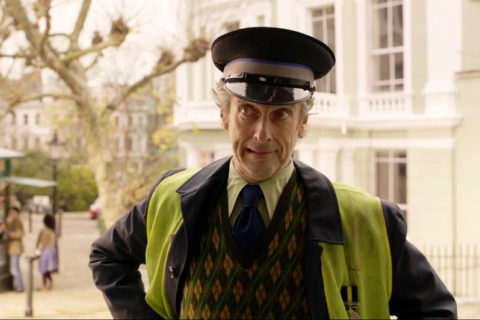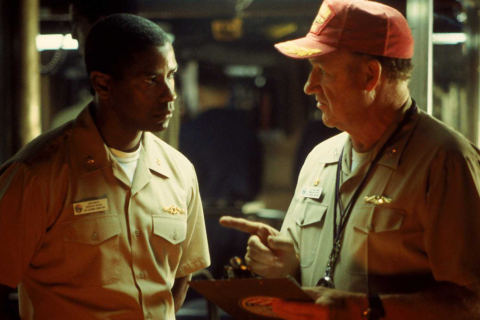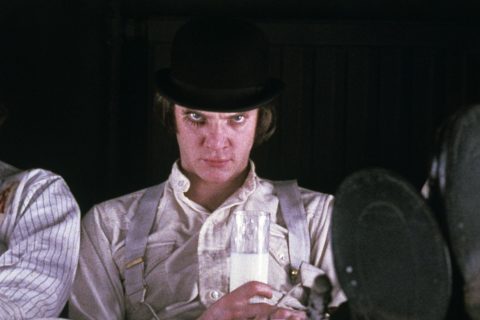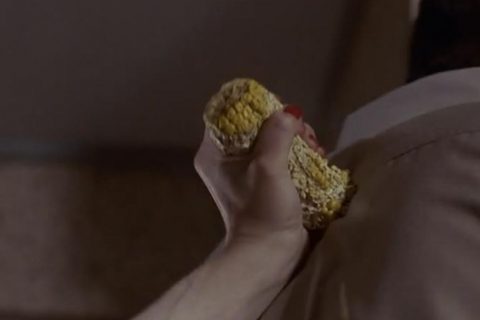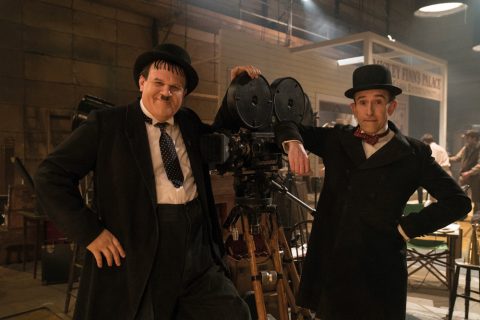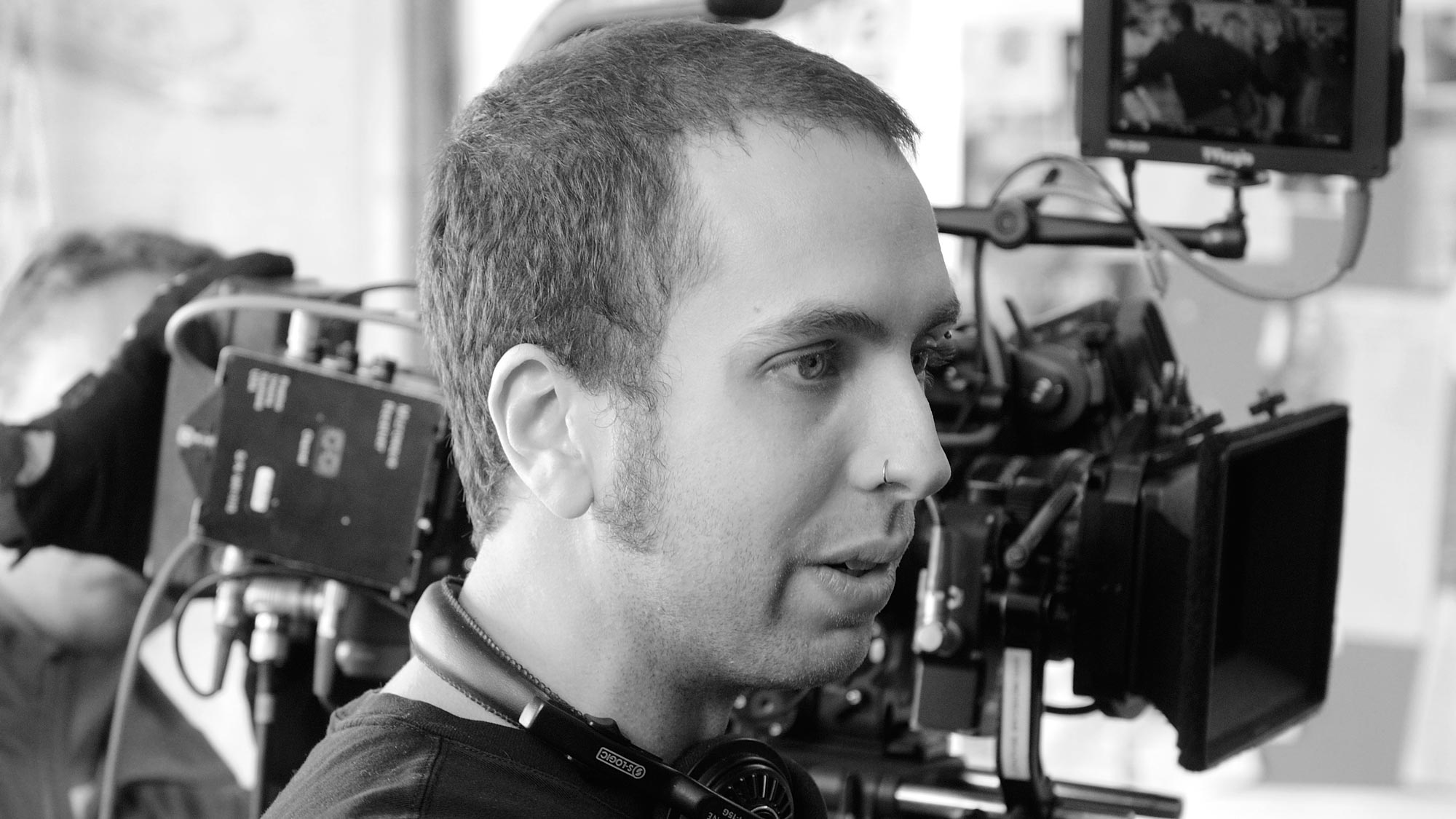
Brandon Cronenberg: Like Father Like Son
Brandon Cronenberg is out to prove anything his dad can do, he can do better…
There is no mistaking Brandon Cronenberg as anything other than the son of acclaimed Canadian auteur David Cronenberg. The evidence isn’t so much in the 33-year-old’s looks, though, as on screen, in the tyro writer-director’s feature debut, Antiviral. Rocking the kind of body horror that made his father’s work notorious, the blood-spattered satire takes our obsession with celebrity to a grisly extreme, imagining a time where fans literally connect with their idols by purchasing their herpes virus, or eating bland-looking slabs of cloned celebrity muscle matter, or grafting strips of skin onto their own.
At the centre is Syd March (played by the weird-looking Caleb Landry Jones), who sells star-sourced viruses to celeb-obsessed fans with all the unctuousness of a snake oil salesman. When he injects himself with a corrupted sample from superstar Hannah Geist (Sarah Gadon), he must find a cure or die painfully.
INDUSTRIA caught up with Brandon to talk about his movie, celebrity, and the sticky issue of following in his famous father’s foot steps.
Antiviral is quite out there. How did the idea come to you?
I started writing it in 2004. I was incredibly sick and having this delirious fever dream where I was obsessing over the physicality of illness and the fact that there was something in my body that had come from somebody else’s body, and that’s what was making me sick. It seemed to me that there was a strangely intimate connection there, if I looked at it from the right perspective.
How did this lead you to include celebrity culture?
I liked the idea of someone seeing disease as more intimate than sex, and I thought, ‘Okay, who could realistically see it from that perspective?’ Someone who is obsessed with a celebrity, it’s not too unrealistic. I wouldn’t be surprised if there were already people that would want to get a disease from the objects of their obsession. As I started exploring that, I realised there was a discussion to be had about celebrity culture that I really wanted to write about.
Your film echoes the kind of body horror that runs through your father’s films, from early low budget movies like Rabid and Shivers, to more recent ones such as Crash and eXistenZ. Is this fascination with the human body a family thing?
Probably. It’s something I am very interested in. We share genes. He is my father. He helped raise me. So I think we just share similar interests. But the body is such a basic aspect of our existence that I feel like we should be obsessed with it, creatively.
How do you feel about the phenomenon of celebrity worship? Is it a virus?
One of the central metaphors in the film, I suppose, is that by participating in that culture we make ourselves diseased, and it’s critical of that culture and satirical. But I also think it’s part of a broader human impulse to deify each other and then to tear each other apart. It’s something that’s very common in our culture today, but it’s a religious impulse, it’s an older impulse. So I’m not sure, exactly, how I think about it. It can be incredibly grotesque but I also think it’s fascinating.
Have you seen any examples of this contagion in real life?
Yeah, someone was telling me about someone, I think it was Sarah Michelle Geller, who was doing an interview on a talk show recently, where she said, ‘I’m sick. I’m going to get the whole audience sick,’ and then everybody threw their hands up and started cheering. I thought, ‘Shit, we have to get this out this year or it’s going to be completely irrelevant.’ The film’s meant to be a cultural caricature but it’s only a slight caricature, really.
Although there’s no actual sex in the film, do you nonetheless see an erotic element to the relationship between fan and celebrity?
Yeah, absolutely. I think there is a definite eroticism to that sort of obsession. There’s a sense that someone is having a personal relationship with this person they’ve never met, and there is an eroticism to that. So in the film there is no sex but there is penetration.
Penetration with needles.
Yeah, so it’s an indirect sex. And disease is kind of an indirect sex. I mean it’s cell penetration by the virus. It grew in someone else’s body and is penetrating the cells of the next host.
Some of the film’s scenes are pretty grisly. Needle phobes will have a tough time. Have we become so comfortable with celebrity culture that you felt you needed to shake us out of our comfort zone in order to make your point?
Absolutely. The thing is I wasn’t being gross to be gross. It was all to aid the satire. So the point of taking culture that is quite grotesque but which we’ve actually become so comfortable with that we don’t feel gross about it anymore and push it to a place where it’s viscerally disgusting was part of the intent.
What kind of research did you do?
I read a fair bit about viruses and I spoke to my doctor, actually, and then at the same time started watching celebrity TV more and looking at magazines.
The look of the film is very clean and sterile. Why did you choose this aesthetic?
I thought it was a good way to focus the attention in the frame. So, for instance, in the clinic you have a largely white frame and then you have the light boxes, which are photographs of the celebrity faces, and then you’re immediately drawn to those faces because everything else is white. So it was mostly a way of controlling the eye of the audience. Also there is a blood theme that runs throughout the film, and blood really pops against a white background. I guess it was a way of getting really specific about what in the frame would attract attention.
Did you tell your dad to stay away during the shoot or ask him for advice?
Well he was pretty busy during the production. I think he was promoting A Dangerous Method and working on Cosmopolis. He was never on set.
What does he think of the film?
He likes it. I’m very close with my father and he likes my film and I like his film Cosmopolis. It’s all very adorable and emotional.
His movies aren’t exactly mainstream cinema. So what was your introduction to cinema and when did you first see one of your dad’s films?
I actually didn’t watch my father’s films until later in life. I think I actually watched Fast Company (David Cronenberg’s 1979 film set in the world of drag racing) when I was a kid. But, you know, I guess I was introduced gradually. But I’m also, I think, too close to my father’s films to really see them with perspective, because they’ve just always been a part of our family’s life.
Jim Loach and Roman Coppola both told us they tiptoed around making their first films – Oranges and Sunshine and CQ respectively – because of their fathers’ reputations. Were you reluctant, or weren’t you bothered?
I actually hated the idea of getting into film for a long time because of preconceptions I encountered and people who assumed I must love film and must want to follow in my father’s foot steps. That was obnoxious and made me want to have nothing to do with film. But then, I guess, I realised at a certain point that was just a bad reason to not do something that was interesting to me.
When did you change your mind?
I was 24 and I was pursuing a bunch of scattered creative interests. Since I was a kid I’ve really wanted to be a novelist actually. I’m a total bibliophile, I really love books, and more than film that’s what I was obsessed with. Then I was also doing a lot of visual art, and I was also playing in bands, and I was too scattered to really focus on one thing in a way where I thought I could get good at it and do anything worthwhile. So I saw film, I guess, as a way of collecting the writing and visual art and music into one art form.
What instrument do you play?
Bass guitar and a little bit of piano, but not seriously.
What style of music did your bands play?
I played in a punk band with some friends of mine until a few years ago. But when you’re a bass player everybody wants you in their band because it’s hard to find a bass player. So a variety of music, really.
There are a lot of scenes in Antiviral involving needles. Were they real or fake?
Some are real. Some are special effects. The fake needles were more of a challenge because it’s really hard to get a convincing fake needle effect. At one point one of them exploded in an art gallery and sprayed blood everywhere. I think it’s hard to do that realistically, especially with a small budget. If you have a huge budget you can make it convincing with a silicone arm, but we couldn’t really do that.
What were you looking for when you cast the lead character, Syd March?
I just wanted someone we really liked. Caleb’s agent and my producer were talking about who might be interesting for the film and he said, ‘Oh, I have this extremely interesting young actor.’ He’s a musician, but he is also a really exciting, fascinating actor, and he can do anything on screen and it’s amazing. So we saw his materials and we thought he was completely exciting.
Sarah Gadon, who appeared in your father’s films A Dangerous Method and Cosmopolis, plays the fictional superstar Hannah Geist. What were you looking for when you cast her?
It’s an interesting role because Hannah’s all over the film but often in still images, and she’s this kind of deity, this icon, and then you sort of glimpse the human being behind that at a certain point. So we needed somebody who could be both believable as the biggest celebrity in the world and who would also have some kind of screen quality that would be convincing in that way, and also be a good enough actor to convey a real human being. That was pivotal. When we saw her as a human, she needed to be very real. So Sarah has that. She’s gorgeous and convincing as a celebrity, but she’s this incredible actress.
What is the connection between celebrity and identity?
I think celebrity characters are completely removed from the human beings they’re based on. I think celebrities are cultural constructs; we take images from people and then we run with them. It’s interesting. I knew, but I didn’t know quite the extent of that, until I got to Cannes in a way. It’s a little like being a character in my own film and finding people will just put words in your mouth. I’m sure someone today will make something up and say I said it, even though I didn’t. But that’s the thing, those celebrities are fabrications. They’re based on people, on images of people, and things that people have said, but they’re really cultural constructs made up from various media. And those cultural constructs are, in a sense, immortal. We forget about them, maybe, but their existence has very little to do with the life and death of the actual human being, who dies and goes on to still be in vacuum commercials after the fact.
It’s like Snoop Dogg performing with a hologram of Tupac Shakur. That was grotesque and creepy. It happened after you wrote this, although it was something you were already touching on in your screenplay.
Yeah, there had already been a Humphrey Bogart commercial so people were doing that, and that’s definitely what I was thinking about at the end of the film. At a certain point, the pesky human has died so you have just the icon to do your bidding. The pure commodity without the inconvenience of a human being.
Did anything surprise you when you were doing your research?
No, I think that whole culture is fairly fascinating and grotesque. At this point nothing is surprising.
Most of the celebrities in Antiviral are women. Was this a conscious choice?
The particularly obsessive culture that I was interested in is more obsessed with women because there is this bodily thing, like who has the worst cellulite or whatever. I guess when I go to the grocery store there are men and women on those covers, but a lot of it is women with parts of their bodies circled. So I guess that was a major current in the culture that I needed to satirise.
Are you afraid of becoming a victim of celebrity?
I’m completely antisocial and reclusive and this is really terrifying. So yes.
When you were younger, did your father ever know someone you really wanted to meet so you asked him if you could meet them?
No. That impulse, I’ve always been put off that. I don’t know why, I never wanted to meet people. Even people I respect, for some reason, I’ve never wanted to push to meet them.
Does Antiviral have a message that you hope people glean?
I don’t think so. It is a social commentary, it is satirical, but I didn’t want it to be purely a statement. I wanted it to be little more of an exploration. I hope it’s not a completely one-note statement but it is satirical and critical.

